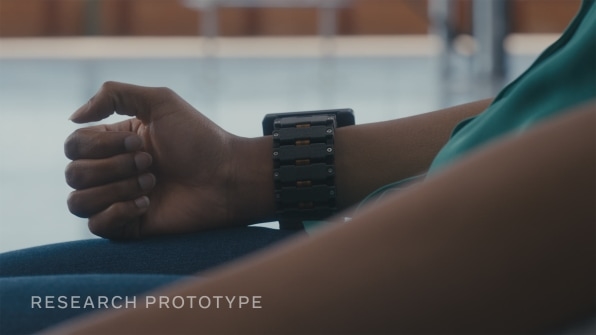Facebook reveals new watch-like controllers for its future AR glasses
While other tech companies tend to keep their R&D under a blanket of secrecy, Facebook is opening its labs and showing the world how it’s developing its future augmented reality (AR) glasses. The company held the second in a series of its “Inside the Lab” media roundtables on Tuesday and introduced new technology that would enable users to control their AR glasses using their fingers.
AR glasses project light onto the eyes and seem to overlay the real world with digital imagery. As you’re looking through the glasses at a statue, for instance, the glasses might display a label with helpful information right next to it. Many people in tech circles believe AR glasses, in some form, will eventually replace the smartphone as our go-to personal computing device.
In this week’s roundtable, company executives, starting with chief technology officer Mike Schroepfer, showed off wrist wearables that detect the movement of the glasses wearer’s fingers. The wearable uses a technology called electromyography (EMG), which intercepts the electrical signals the brain uses to direct finger movements. It then translates the electrical pulses into digital commands that can control functions of the device functions.
For example, if the user is looking directly at a big blue button within the AR display on their face, they might “push” the button by making a tapping motion with their index finger.

It also might be possible to train the bracelet to interpret the electrical signals the brain sends to the fingers to hit specific keys on a (virtual) keyboard.

The Facebook wrist wearable prototypes can also generate a tactile signal (like a buzz or knock or squeeze) to acknowledge that the wearable computer has received a command. Or it might give the user a tactile signal to prompt them to do some action.
There are other ways to interact with AR glasses, including voice commands, or using some form of handheld device like a smartphone or a game controller. Facebook says voice commands might be subject to eavesdropping and could be a threat to privacy if they’re used in public. A handheld device, Facebook’s engineers believe, would only “put a layer of friction” between the user and the AR technology. “As we explored the possibilities, placing an input device at the wrist became the clear answer,” Facebook engineers wrote in a blog post Thursday.
“The wrist is a traditional place to wear a watch, meaning it could reasonably fit into everyday life and social contexts,” they added. “It’s a comfortable location for all-day wear.”
A tale of two glasses
It’s funny Facebook should say that, because the company that will likely be its chief rival in the AR glasses space is Apple, the creator of the world’s best selling smartwatch. Apple will reportedly release its first AR/VR glasses in 2022, Bloomberg reports (there’s no word on whether it’ll employ the Watch as a control device). Facebook plans to first release a pair of smart glasses this year, before launching full AR glasses at some unspecified future date.
Facebook and Apple may be the two big tech companies with the people, cash, ecosystems, and strategic motivation to create AR glasses and experiences polished enough to appeal to millions of mainstream consumers. Both companies want to own the next big paradigm in personal computing, the technology that will replace the smartphones of today.
And yet the two companies couldn’t be more different in their approach. Facebook is opening the doors to its labs and showing the world what it’s working on. Meanwhile in Cupertino, the silence around Apple’s as-yet-unannounced AR glasses couldn’t be louder.
Some of the difference in approach may be attributable to the two companies’ reputations around privacy. Facebook is the first to say that AR glasses will be the most personal of any tech device before it. The technology will rest directly in front of your eyes, mediating your experience of the real world. It will track the gaze of your eyes, record and learn from your habits and preferences, and use AI to predict what you might need at a certain time, or within a specific environment. It will generate mountains of highly personal data–data that, if stolen or sold, could be a goldmine for hackers, identity thieves, or advertisers.
Apple has gone to great lengths to convince customers that their personal data is their own, and that the company is even willing to go head to head with law enforcement to keep it private. Apple CEO Tim Cook likes to say data privacy is a “human right.” Facebook, other the other hand, has built its whole business on the covert collection of users’ personal data; and its CEO once famously declared that privacy is a social norm that “evolves over time.” The two CEOs have engaged in a running joust over the issue.
Part of the reason for all the posturing and sparring is that both CEOs seem to be betting that the next big personal computing device will be wearable, and powered by AI, and more personal than anything seen before. Privacy will matter, a lot. And the company that sells the new device to the masses will have to be trusted.
Apple is in a better position than Facebook on this count. Facebook’s “Inside the Lab” show-and-tell sessions may be part of a plan to rebuild consumer trust—just in time for the release of its first AR glasses a few years from now.
Fast Company , Read Full Story
(40)



